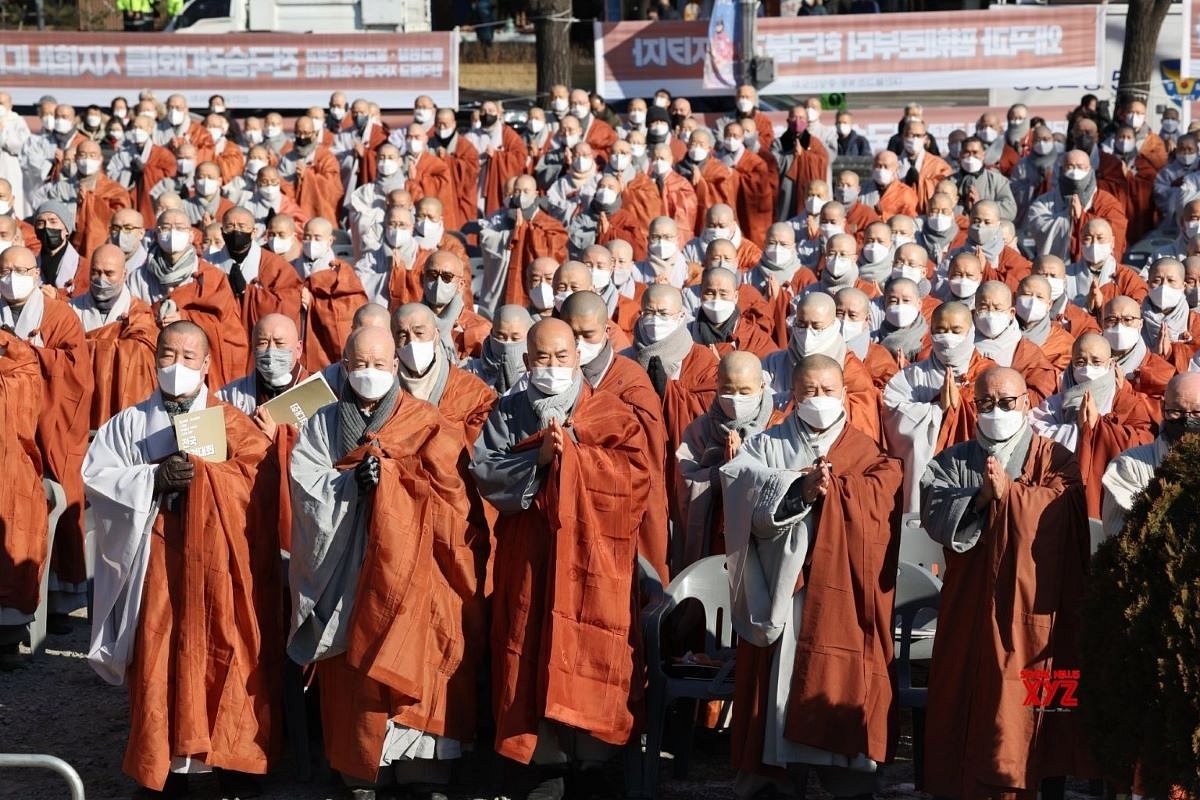News Brief
South Korea: Thousands Of Jogye Order Monks Stage Protest Against Government's 'Anti-Buddhist Bias', Christian 'Favoritism'
- Thousands of monks, belonging to the Jogye Order of Korean Buddhism (the largest Buddhist sect in South Korea), took to the streets protesting against President Moon Jae-in for what they termed as his government's anti-Buddhist bias and discriminatory state policies.
- The monks, estimated to be as many as 5000, called for the enactment of laws to prevent further religious bias against Buddhism and measures to preserve its national heritage.
- Buddhist groups have frequently flagged issues ranging from the proportion of Buddhists in President Moon’s cabinet, to a state-sponsored campaign to promote Christian carols.

Protest By Jogye Order of Korean Buddhism
Thousands of monks, belonging to the Jogye Order of Korean Buddhism (the largest Buddhist sect in South Korea), took to the streets in Seoul today (Jan 21), protesting against President Moon Jae-in for what they termed as his government's anti-Buddhist bias and discriminatory state policies.
The Jogye Order and other sects have long alleged that the policies of the current Korean regime discriminates against them. Buddhist groups have frequently flagged issues ranging from the proportion of Buddhists in President Moon’s cabinet, to a state-sponsored campaign to promote Christian carols.
In December 2021, the country's Ministry of Culture, Sports and Tourism hosted a nation-wide carol promotion campaign. Jogye Order criticised the event as an explicit promotion of a specific religion by the government using taxpayer funds.
The monks, estimated to be as many as 5000, staged protest at Jogyesa, the chief temple of Jogye Order. They also called for the enactment of laws to prevent further religious bias against Buddhism and measures to preserve its national heritage.
"The government is to preserve cultural heritages, but it now dares to instigate religious conflicts and shift the responsibility," Ven. Wonhaeng, the head of the Jogye Order, said during the rally held at Jogye Temple.
The immediate provocation for the protest was a remark by ruling party lawmaker, Jung Chung-rai of the ruling Democratic Party, comparing Buddhist temples "cultural asset viewing fees" to a legendary swindler known for selling river water for money,
After initially refusing to apologise, Jung later offered one, but the Jogye Order refused it.
Korea's largest Buddhist sect also criticized a plan by the local government to designate "Cheonjinam Pilgrimage Route" as a Catholic site, despite its historic significance to both Buddhists and Catholics.
"Buddhism survived the Joseon Kingdom for about 500 years and it is necessary to tell everyone that the religion should not be treated unfairly," Ven. Wonhaeng, the president of the Jogye Order of Korean Buddhism and the head of a special committee for the rally, said during the order's meeting on Jan. 6.
The Friday rally marks the first time in 14 years that the Jogye Order took to the streets in protest. In 2008, the Jogye order protested against the then Lee Myung-bak administration for ordering illegal surveillance of the sect's president and other highly ranked monks.
In 2008, the heads of major Buddhist orders, including Jogye, Cheontae and Taego, along with representatives from 25 congregations, called on the Lee Myung-bak administration to end what they call its Christian favoritism, yesterday at the Jogye Temple in Jongno District, central Seoul.
Buddhist Protest Rally Just Days Before Presidential Election
Friday's protest comes days before the country's presidential race. Ruling party presidential candidate Lee Jae-myung is locked in a tough fight against his main opposition rival Yoon Suk-yeol.
According to some observers the anti-government sentiment among Buddhists could adversely affect the chances of ruling party candidate Lee Jae-myung.
Christianity, which was barely one percent of the population in 1900, today has 29 percent identifying themselves as Christian. The country produces more missionaries than any other country in the world, bar the U.S. Buddhism is followed by 23 percent of the population
Support Swarajya's 50 Ground Reports Project & Sponsor A Story
Every general election Swarajya does a 50 ground reports project.
Aimed only at serious readers and those who appreciate the nuances of political undercurrents, the project provides a sense of India's electoral landscape. As you know, these reports are produced after considerable investment of travel, time and effort on the ground.
This time too we've kicked off the project in style and have covered over 30 constituencies already. If you're someone who appreciates such work and have enjoyed our coverage please consider sponsoring a ground report for just Rs 2999 to Rs 19,999 - it goes a long way in helping us produce more quality reportage.
You can also back this project by becoming a subscriber for as little as Rs 999 - so do click on this links and choose a plan that suits you and back us.
Click below to contribute.
Latest